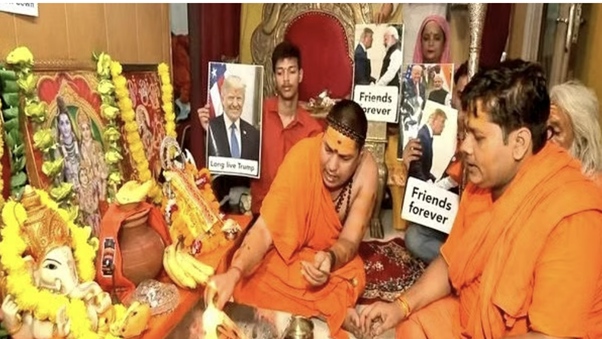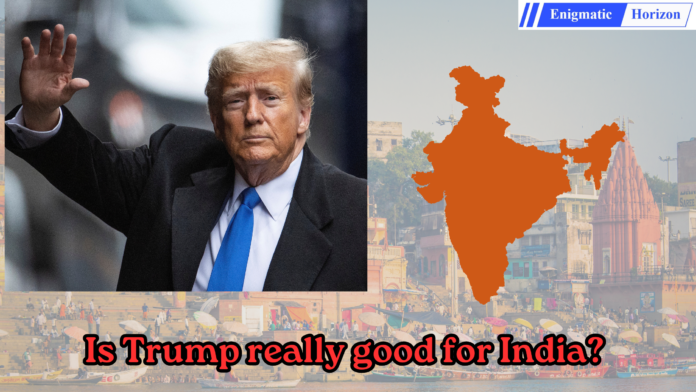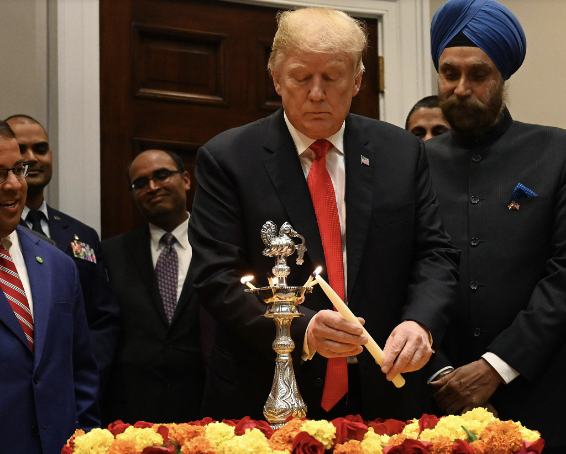Robin Bhuyan
Donald Trump’s recent 2024 victory against Kamala Harris has ignited a lot of controversy, much like after his victory back in 2016. While many people, especially leftists and liberals are seen to be upset and outraged by this victory, and worried about the potential impact of his administration, many people, especially those who are inclined towards conservative and right-wing ideologies, are happy for his win and are looking forward to Trump’s second term as US President.
Why Many Indians and Hindus Cheer for Trump?
For years, Trump has captured the attention of Indian right-wing supporters, in part due to his blunt style, anti-establishment stance, and firm views on immigration and national sovereignty, which resonate with India’s conservative segments. Trump can be arguably called the most popular President amongst Indians, and many Indians have also been conducting Poojas and Rituals, praying for his victory!

Many may wonder— why so much affection for a President of a different country, with whom they have almost nothing in common? However, Trump’s policies often echo the nationalistic sentiments shared by some right wing or nationalist Indians, emphasizing strong borders, a focus on economic growth, and an “America First” approach that parallels India’s own “Make in India” initiative. Another main reason could be that many Hindus in India are worried about the problems caused by Islamic fundamentalism, and Trump has made several statements criticizing this.
Moreover, Trump’s also managed to create a personal connection with India, and this has also bolstered his appeal amongst Indians. His family members have also made visits to Hindu temples before the elections, in order to create a friendly relation with Hindu voters. His rallies, such as the “Namaste Trump” event in Ahmedabad in 2020, projected a friendly, high-profile image that many Indians remember fondly. For Indian-Americans, Trump’s policies on taxation and business reform have sometimes aligned with their financial interests, which is one of the reasons they cheer for him.
Trump’s Policies Towards India: A Closer Look
Despite the blind affection Trump has received from Indians, it is important to take a closer look at his policies, before we decide if Trump is really good for India in the long term.
- Trade and Economic Relations: During his previous tenure, Trump’s trade policies with India were a mix of tariffs and negotiations. Although Trump enforced tariffs on certain Indian exports, his administration also expressed openness to reaching a new trade agreement, pushing for greater reciprocity. This approach is a double-edged sword: while it demands fairer terms, it can also strain the relationship if not managed carefully.
- Defense and Strategic Partnership: Trump’s emphasis on the Quad alliance (with the U.S., India, Japan, and Australia) strengthened India’s strategic positioning in the Indo-Pacific. His administration pushed for defense deals that would enhance India’s military capabilities, such as the purchase of Apache helicopters and other advanced military hardware. This partnership allowed India to fortify its stance against regional threats, especially concerning China.
- Immigration and H-1B Visas: When it comes to Trump’s policies on immigration, many Indians were upset regarding his stance on immigration and the H-1B visa program. His approach was seen as restrictive by many Indian professionals who had been aspiring for employment in the U.S. While these policies sought to protect American jobs, they also created obstacles for Indian tech talent, who are quite frustrated with the lack of jobs in their own country. This can be seen as one of Trump’s policies which affect his link between the two nations.

- Counterterrorism and Security Cooperation: Trump’s has always had firm stance against terrorism, particularly against threats from Pakistan, and this gained the support of many Indians. His administration’s decisions, such as cutting aid to Pakistan in 2018, were seen as supportive of India’s security concerns. Trump’s also labelled of Pakistan as a “safe haven for terrorists”, and this connected with India’s populace, as most of us are quite fed up of this since a very long time.
- Cultural and Symbolic Ties: Trump has shown respect to Indian culture and his large-scale outreach to the Indian-American community helped foster goodwill. Events such as “Howdy Modi” and Trump’s focus on celebrating Diwali in the White House conveyed a respect for Indian cultural values, earning him huge favor among Hindus and Indian Americans.
Is Trump Truly Beneficial for India?
While Trump’s policies on defense and counterterrorism have aligned with India’s strategic objectives, his stance on trade and immigration has not always been favorable towards Indians.
If we talk about India’s economic and social interests, Trump’s “America First” policies may pose challenges for trade negotiations, and his immigration policies could hinder the flow of skilled Indian professionals to the U.S., who are frustrated with lack of employment in India.
However, Trump administration has continued to support India’s geopolitical and security interests, and this might help benefitting India’s regional position. If Trump adopts a balanced approach toward trade and immigration, focusing on mutual benefits, it might help in building a more productive and better relationship with India.
Conclusion
It is true that Donald Trump’s recent win has left many Indians optimistic about potential continuation favorable U.S.-India relations. However, it is to be remembered that politicians will come and go, but it is billionaire businessmen, influential capitalists and investors who drive the deepest, lasting impact on the world as well as the relationship between US and India. From technology giants to investment moguls, it is these individuals who drive transformative changes, and push boundaries in ways that politicians can’t achieve. With this in mind, maybe it is better if we take these electoral outcomes with a grain of salt. Instead, should we not recognize that the most enduring influence often comes from those building and controlling the world’s economic and technological frameworks?

